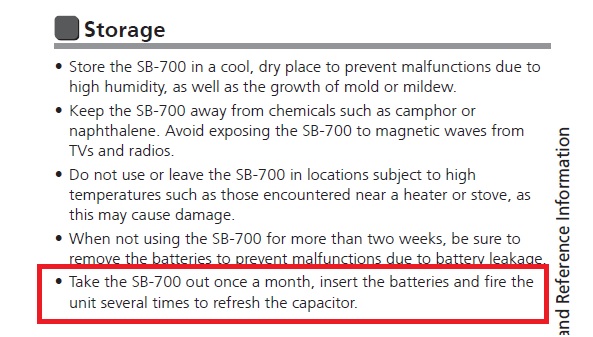What happens to the charge in a camera's flash when it's stored?
Nov 22, 2018 09:30:43 #
This is just a general knowledge question. I wonder about this every time I put away a flash or strobe. Every time a flash is used, its capacitor gets charged again, apparently with up to 300 volts, for the next shot. What happens when you turn the flash off and store it away? Does the charge remain in the capacitor or does it get dissipated?
I know that with my Nikon flash, they recommend that it is fired a few times every month the refresh the capacitor. If the flash isn't charged for some time the dielectric layer inside can deform. That would suggest that maybe the charge is being dissipated somehow.
I know that with my Nikon flash, they recommend that it is fired a few times every month the refresh the capacitor. If the flash isn't charged for some time the dielectric layer inside can deform. That would suggest that maybe the charge is being dissipated somehow.

Nov 22, 2018 09:38:32 #
PaulBrit
Loc: Merlin, Southern Oregon
My assumption is that the charge slowly declines. At least that what happened in the past, back in the days when I was working (hobby) on electrical circuits. Now the technology involved will make capacitors a whole different thing but nonetheless a capacitor is a capacitor!
Nov 22, 2018 09:39:06 #
Nov 22, 2018 09:39:46 #
The charge in the cap will slowly dissipate over time. Firing the flash every few months is a good idea to keep the cap working.
Nov 22, 2018 09:40:07 #
Good question, I don't have the answer!
Hope someone does and shares it with us

Swede
Hope someone does and shares it with us


Swede

Nov 22, 2018 09:45:30 #
Nov 22, 2018 09:50:05 #
Nov 22, 2018 09:53:21 #
jerryc41 wrote:
That's a good article. I found it interesting that some people would use old televisions for parts and get an electrical shock from the capacitors. Some of the televisions were decades old.
Nov 22, 2018 09:56:17 #
Pablo8
Loc: Nottingham UK.
Some charge will remain in the capacitor. You can find this out, if you try to dismantle a unit, and put your fingers across the terminals of the capacitor. They need properly and fully discharging. One flash -fire will NOT do it. They can give a lethal kick to the unwary.
Nov 22, 2018 10:47:55 #
PaulBrit wrote:
My assumption is that the charge slowly declines. At least that what happened in the past, back in the days when I was working (hobby) on electrical circuits. Now the technology involved will make capacitors a whole different thing but nonetheless a capacitor is a capacitor!
Correct. The capacitor that holds the flash tube charge is not perfect (none are 100%), and being connected to the associated circuitry, the charge leaks down to zero over time.
Nov 22, 2018 12:05:33 #
PaulBrit
Loc: Merlin, Southern Oregon
Pablo8 wrote:
Some charge will remain in the capacitor. You can find this out, if you try to dismantle a unit, and put your fingers across the terminals of the capacitor. They need properly and fully discharging. One flash -fire will NOT do it. They can give a lethal kick to the unwary.
Thanks!
Nov 22, 2018 16:22:14 #
CO wrote:
This is just a general knowledge question. I wonde... (show quote)
A Capacitor is going to slowly loose charge over time; how long I have no idea. As far as periodically charging and firing, my strobe is the least used piece of equipment I have, and it never, ever fails after long periods of non use.
Nov 23, 2018 06:00:19 #
billnikon
Loc: Pennsylvania/Ohio/Florida/Maui/Oregon/Vermont
CO wrote:
This is just a general knowledge question. I wonde... (show quote)
I store my flashes fully charged. I take mine out once every two months and fire them off. Reforms the capacitors. Never had a problem in over 40 years of professional photography.
Nov 23, 2018 07:39:57 #
CO wrote:
This is just a general knowledge question. I wonde... (show quote)
Yes, the charge can be dissapated over time, but the other issue is the capacitor can dry out if not used. Same for a tv or other electronic devices. So, use it or loose it would be the rule.
Nov 23, 2018 08:08:55 #
billnikon wrote:
I store my flashes fully charged. I take mine out once every two months and fire them off. Reforms the capacitors. Never had a problem in over 40 years of professional photography.
Yes, better to let it charge and then turn off and remove the batteries for storage.
If you want to reply, then register here. Registration is free and your account is created instantly, so you can post right away.




